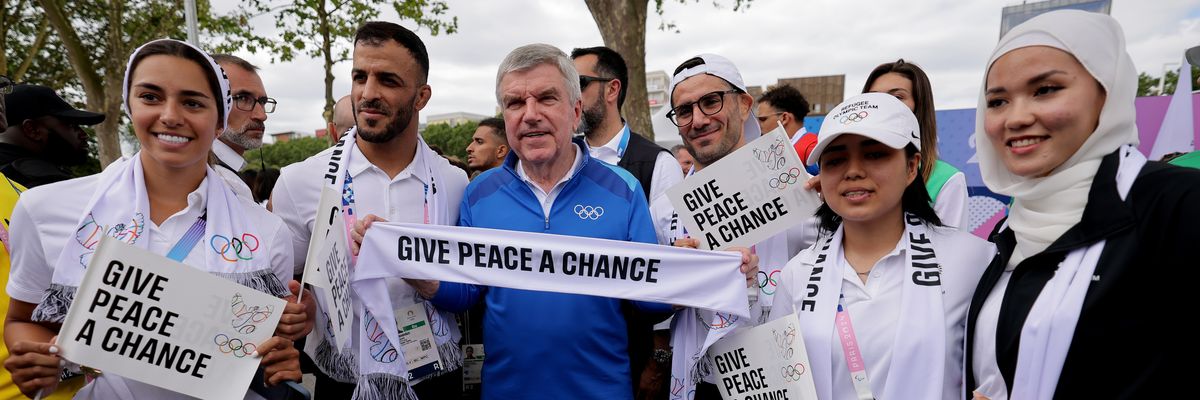To meet the nutritional needs of 15,000 athletes and staff from
208 countries and territories, the 2024 Paris Olympics will need to prepare 40,000 meals every day—which adds up to 1.2 million meals, including 3 million bananas and 27 tons of coffee.
Their diverse
sports demand very different requirements. Some athletes must maintain an exact weight, while others may need to increase their carbohydrate or protein intake. After all, nutrition fuels athletic performance.
And yet, some athletes come from places where malnutrition is a constant concern. In many parts of the world, hunger is deeply linked to conflict, which has been
on the rise. More than 117 million people were forcibly displaced last year. It can create a vicious cycle, as many displaced people face hunger and uncertainty. But, their stories don’t have to end there.
As we prepare to cheer on the Refugee Olympic Team, we’re spotlighting accomplished athletes and their countries of origin—all places where Action Against Hunger runs programs that can help the next generation realize their potential.
Talent is everywhere, and it can become greatness when it is nourished. For proof, look no further than the
Refugee Olympic Team. Launched at the 2016 Olympic Games in Rio, the team is a symbol of hope. This year, the team is composed of 37 athletes from 15 National Olympic Committees, competing across 12 sports. To be eligible, an athlete must be a top competitor in their sport and a refugee in their host country.
Action Against Hunger is familiar with the ongoing global refugee crisis, which has
surged in recent years. Conflict is a major driving force behind the growing displacement, and more forced displacement equals more hunger—more than 85% of people living in conflict-affected countries are experiencing food insecurity.
As we prepare to cheer on the Refugee Olympic Team, we’re spotlighting accomplished athletes and their countries of origin—all places where Action Against Hunger runs programs that can help the next generation realize their potential.
Afghanistan
After decades of conflict and growing climate stress, 24 million Afghans, or nearly 60% of the population, need help to afford food and other basic necessities. Studies have shown that a majority of the population also is dealing with mental health challenges, which can be deeply linked to hunger.
A number of athletes originally from Afghanistan are part of the Refugee Olympic Team. We’ll be rooting for them:
- Manizha Talash is a breakdancer who now resides in Spain but has been reunited with members of her hip-hop community from Kabul.
- Farzad Mansouri’s sport is taekwondo. Born in Parwan, he was part of the Afghan Olympic Team in Tokyo 2020 before he had to leave his country due to safety concerns.
- Nigara Sha Heen was born in Afghanistan and currently resides in Peshawar, Pakistan. She is a judoka (someone who practices judo) and competes in the -70 kilogram category.
- Arab Sibghatullah also practices judo, and his love for the sport began when he was eight years old. Originally from Kunduz province, he now lives in Germany.
- Amir Ansari is a cyclist. Born in Iran, he grew up in Afghanistan before he was forced to flee in 2015. He now lives in Sweden and trains with the Stockholm Cycling Club.
Sudan
Hunger has long been widespread in Sudan, and when civil war broke out last year, things became even worse. Sudan’s health system is under extreme stress and millions of people face crisis levels of hunger, yet only 30% of its hunger-related programs are funded.
In this year’s Paris games, two outstanding athletes originally from Sudan are competing on the Refugee Olympic Team:
- Musa Suliman competes in the 400 meter. Born in Sudan, he moved to Cairo at the age of nine and to Switzerland in 2021.
- Jamal Abdelmaji is a track athlete who ran the 5,000m in the 2020 Olympic Games. He fled Darfur as a teenager and now lives with a host family in Tel Aviv, Israel.
Ethiopia
Recently one of the world’s fastest-growing economies, Ethiopia now faces one of the 10 worst food crises on the planet. Conflict and climate-related drought have taken a toll. An estimated 40% of its children under five are stunted, meaning that chronic or recurring malnutrition is preventing them from reaching typical growth milestones.
Here are two Ethiopian athletes participating in this year’s Refugee Olympic Team:
- Eyeru Gebru is a cyclist from Ethiopia who moved to France in 2021 in order to escape conflict at home.
- Farida Abaroge grew up in Jimma and is passionate about running, football, and karate. Forced to leave Ethiopia at a young age, Abaroge traveled through many countries before finally finding refuge in France.
These athletes are a testament to what people can overcome—but nobody should have to. Hunger is manmade, and the solutions can be, too. Together, we can create a world where every life is well nourished.
We hope you’ll join us in showing your support for athletes and refugees during the 2024 Paris Olympic Games. Cheer them on, share their stories, and post about them on your socials. Note the link between nutrition and performance in sports and in life, celebrate the talent that can emerge from hardship, and help bring attention to the tens of millions who still need support.

